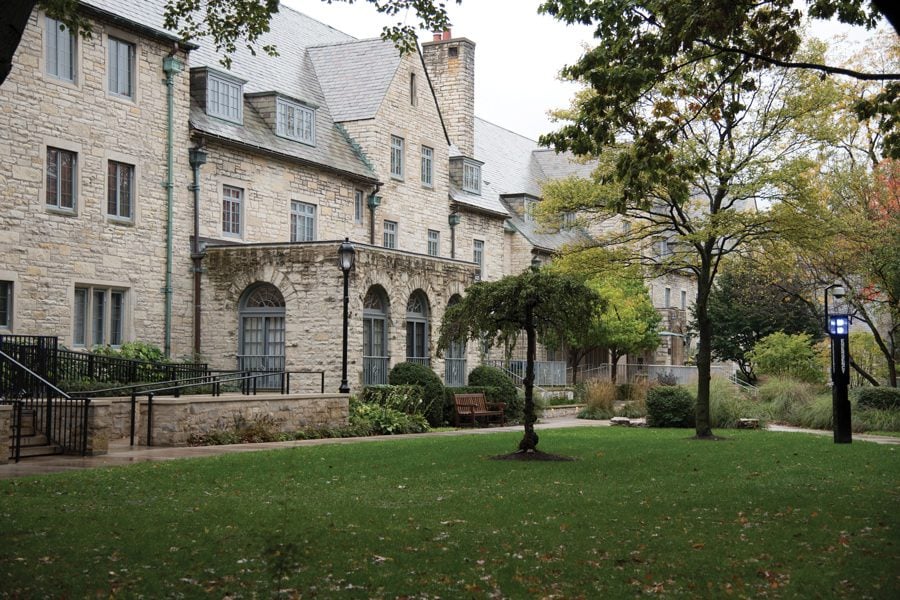A guide to Greek life at NU
Daily file photo by Allie Goulding
Northwestern’s sorority quad. The Panhellenic Association has called for the disbandment of Greek chapters on campus following calls for abolition this summer.
August 23, 2018
Though Northwestern is far from a large state school, a surprisingly vibrant Greek community exists on campus, with nearly 40 percent of the student body participating in Greek life. So what’s the first step towards going Greek?
A good place to start is understanding the structure of Greek life at Northwestern. There are four major governing bodies for NU’s Greek organizations: the Interfraternity Council, the Panhellenic Association, the Multicultural Greek Council and the National Pan-Hellenic Council.
IFC is responsible for 18 of the fraternities on campus: Alpha Epsilon Pi, Beta Theta Pi, Delta Chi, Delta Tau Delta, Delta Upsilon, Lambda Chi Alpha, Phi Delta Theta, Phi Gamma Delta, Phi Kappa Psi, Phi Mu Alpha, Pi Kappa Alpha, Sigma Alpha Epsilon, Sigma Chi, Sigma Nu, Sigma Phi Epsilon, Theta Chi, Zeta Beta Tau and the Evans Scholars. SAE is returning back to campus in the fall following their suspension in April 2017.
PHA serves as IFC’s largest counterpart with 12 nationally recognized sororities. These are Alpha Chi Omega, Alpha Phi, Chi Omega, Delta Delta Delta, Delta Gamma, Delta Zeta, Gamma Phi Beta, Kappa Alpha Theta, Kappa Delta, Kappa Kappa Gamma, Pi Beta Phi and Zeta Tau Alpha.
IFC and PHA’s chapters all participate in formal recruitment during the first week of Winter Quarter. While sorority rush is more structured than IFC recruitment and does not allow recruiting of any kind before January, Northwestern’s rush process is less stringent than many other schools — PHA chapters do not require letters of recommendation.
Beyond these two large governing bodies exists two smaller councils: MGC and NPHC. These two councils each consist of both fraternities and sororities, and they’re set apart from IFC and PHA for their focus on culture.
The NU Office of Fraternity and Sorority Life website says the chapters are “culturally-based service-social organizations” with Latinx, Asian, South Asian and multicultural emphasises.
MGC has eight chapters, including Alpha Iota Omicron Fraternity, Kappa Delta Chi Sorority, Kappa Phi Lambda Sorority, Lambda Theta Alpha Latin Sorority, Lambda Upsilon Lambda Fraternity, Omega Delta Phi Fraternity, Sigma Lambda Gamma Sorority and Sigma Psi Zeta Sorority.
NPHC, on the other hand, serves as the governing body for historically African-American fraternities and sororities, including Alpha Phi Alpha Fraternity, Delta Sigma Theta Sorority, Zeta Phi Beta Sorority, Kappa Alpha Psi Fraternity and Sigma Gamma Rho Sorority.
MGC and NPHC’s recruitment processes are less structured than those of PHA and IFC. Intake of new members happens throughout the year, and specific recruitment processes vary by chapter. NPHC Vice President Derick Wallace, a Weinberg senior, said their chapters tend to be a lot smaller than those of IFC or PHA but still maintain a strong campus presence.
If all these options aren’t enough, Northwestern also offers many pre-professional or special interest co-ed fraternities, from pre-business fraternity Alpha Kappa Psi to the pre-law Phi Alpha Delta. Others include pre-med and service organizations, which also host formal recruitment processes.
Wallace said it’s important to research the available chapters within all the Greek councils and be open to new possibilities during recruitment. MGC President Kathy Tian, a Weinberg senior, also advises those looking to go Greek to focus on how each chapter feels and their “vibe.”
“When you talk to (different chapters), there’s just a different vibe people get,” Tian said. “One isn’t necessarily better or right, it’s just different, and I think that’s the main thing people should use to judge whether or not they want to join an organization.”
Email: ruiqichen2020@u.northwestern.edu
Twitter: @ruiqi_ch
Read more from the 2018 Orientation Issue here.



